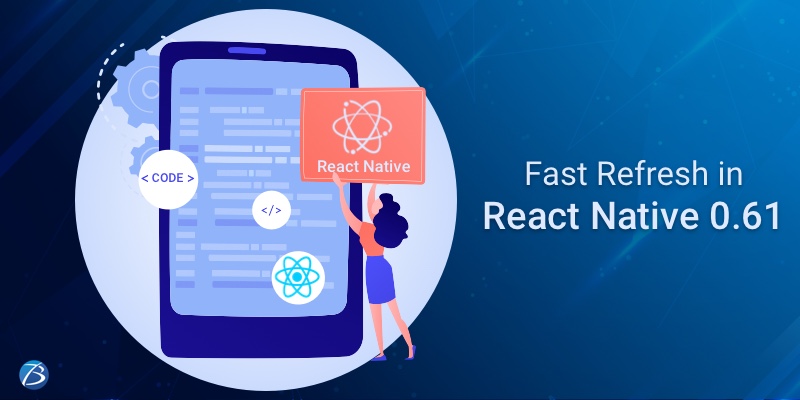Influence of Fast Refresh Feature in React Native 0.61 on the Developer Community!


What are the Persistent Issues in the React Native Framework?
What Features are Covered in React Native’s 0.61 Version?
How does the ‘Fast Refresh’ Feature in this Update Impact the Developer Community?
All such questions about React Native 0.61 version will be covered in this blog. We will especially elaborate on the Fast Refresh Feature in this blog. So without much delay, let’s get started.
A Bit about React Native 0.61
React Native 0.61 is quite a small update comparatively. It is an attempt to resolve several persistent issues present in the older versions. The broken hot-reloading feature was one of the biggest pain points for React Native App Developers and the Community. This new update majorly focuses on a new reloading experience called Fast Refresh. With this update, the developer community can heave a sigh of relief.
But before looking into features in this new version, let’s have a quick look at the persistent issues in React Native. Like any other technology, this technology had several shortcomings and no matter how small, but these shortcomings did affect the overall mobile app development.
Shortcomings in React Native Framework!
Hot-reloading Issue: Being one of the most popular features of React Native, the hot-reload feature got much attention from the developer community. But sadly, it didn’t go that well and especially failed to work appropriately with Stateless Functional Components (SFC). In the React Native 0.61 version, this issue has been fixed, and now, reloading any React Native code reliably is possible without reloading the complete application.
Time-consuming Updating Process: Updating React Native from an older version to a new one is tedious and needs a lot of time. This process especially becomes highly time-consuming in case the React Native Developers haven’t installed a few updates and then want to update it once for all.
Sudden App Crashes at Times: Several times, React Native apps can crash suddenly and there is not much information available to know the reason for such app crashes.
Finding Main Reason of Exception: Finding the main reason for the exception is quite challenging in the React Native framework. Stack trace in the Chrome debugger console makes the debugging process much time-consuming. In this case, component DidCatch also doesn’t seem much helpful.
Issues with Ram Bundle: The ram bundle of React Native isn’t supported by any OTA platform like CodePush. This issue is caused since React Native community is not connected widely.
So, to overcome such challenges and solve the existing bugs, React Native 0.61 was introduced. New features in this version will help the developer community to leverage an improved development process and also result in a better end-product.
Notable Features of React Native 0.61 and its Impact on the Developer Community

Better CocoaPods support: A few updates in the 0.60 version of React Native were by default made to integrate CocoaPods. But this leads to several issues in the use_frameworks! But thankfully, this issue is being worked upon and fixed in 0.61. After this update, it has become much simpler to integrate React Native into the iOS projects that are developed with dynamic frameworks.
React 16.9 Upgrade: In this version, there have been improvements to act. Also, the old names for the UNSAFE_ lifecycle methods have been deprecated.
The ‘useWindowDimensions Hook’ Feature: Hook is another fascinating feature introduced in this version that offers and subscribes to dimension updates. This feature can be used instead of the Dimensions API in several cases.
Fast Refresh: The “hot reloading” and “live reloading” features have been unified into a single feature called “Fast Refresh” for addressing the hot-reloading issue. This update is quite helpful to the developer community and every React Native App Development Company. So, let us have a quick look at what’s so impressive about this feature.
Significance of the Fast Refresh Feature
The hot-reload issue needed enhancements for a long time and in this update, it has been addressed. So, what are these enhancements, and how is these will impact the developers as well as React Native App Development services leveraging this framework? Please read along.
- The feature doesn’t exercise invasive code transformations. Thus, the code can be considered more reliable and trustworthy even if kept ON in the settings by default.
- This feature provides complete support to new-age React along with function components and Hooks completely.
- This feature helps to skilfully recover from typos and similar mistakes. Besides, whenever required, the Fast Refresh feature can be switched to full reload.
Final Views:
We have seen several features of React Native 0.61 version along with its Fast Refresh feature. About this feature, the developer community finds it much flexible to use. It works well for both functional components and class components. Though it is almost similar to the hot-reloading feature, this time, it is much more efficient and excellent in performance.
That is all in this post!
What is your experience with React Native 0.61? Do share in the comments section.
For any further assistance, please feel free to discuss with us!



